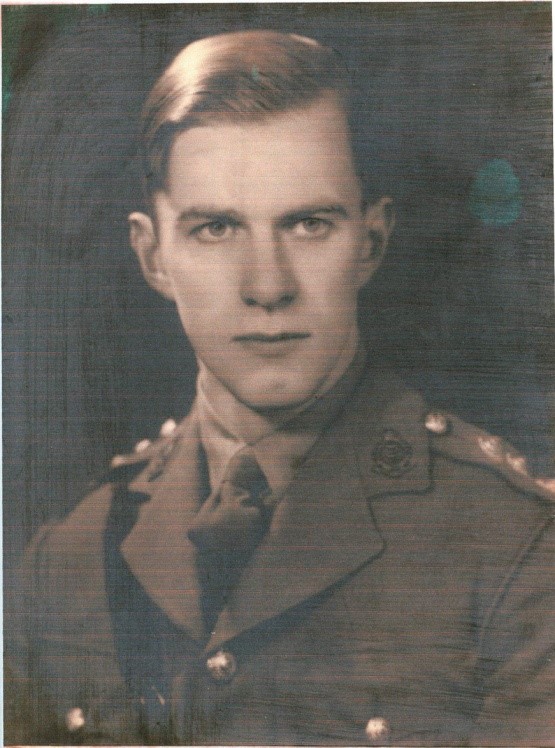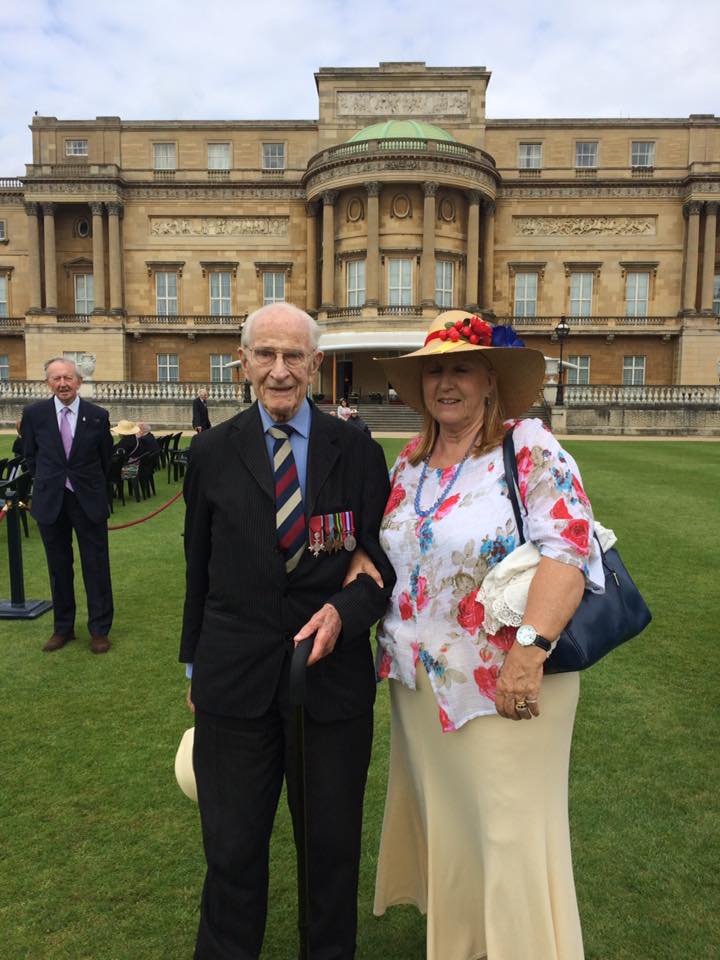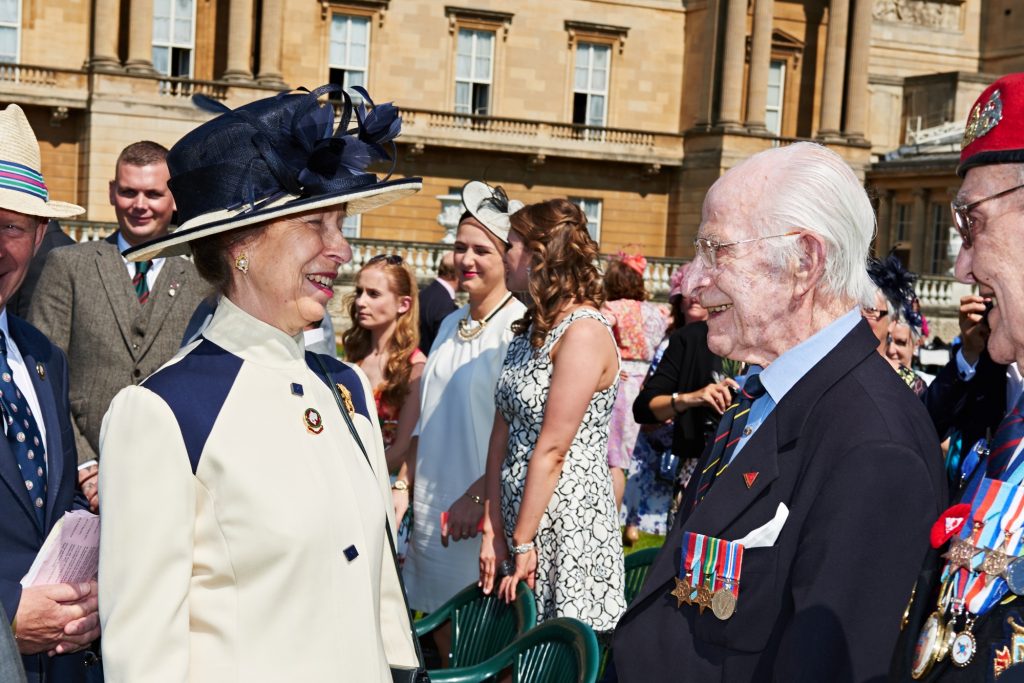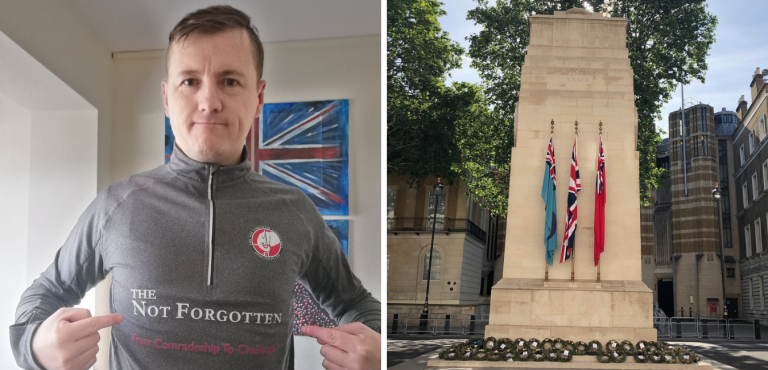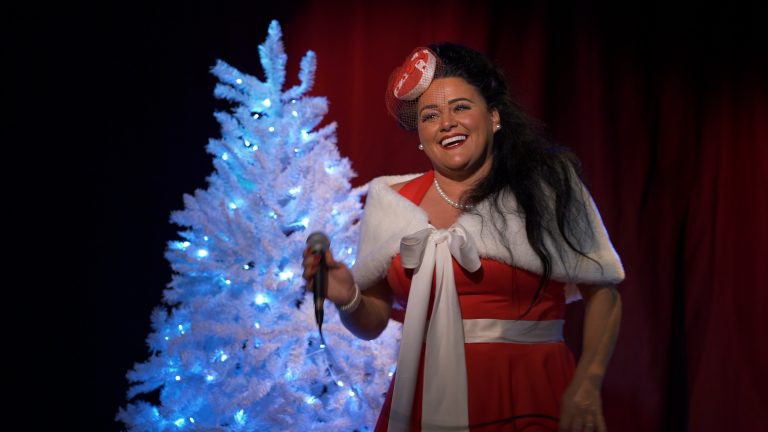Remembering Dr William Frankland MBE
I first met Bill Frankland in July 2012 at The Not Forgotten’s Wimbledon Tennis Outing and I was astounded at how alert and talkative he was for his age – then 100. Bill and I became good friends and we often met or spoke on the telephone – right up until last week when he sounded on top form. In 2014 he received The League of Mercy Award through The Not Forgotten, in 2015 he was made an MBE and in 2018 his biography by ”From Hell Island to Hay Fever – The Life of Dr Bill Frankland” was published.
Bill was The Not Forgotten’s oldest beneficiary and attended a number of Not Forgotten events as a former Far East Prisoner of War, for example at Buckingham Palace and St James Palace. Sir Ben Bathurst wrote, “Dr William Frankland has been superb in the manner in which he has engaged with the younger beneficiaries and been an inspiration to those still recovering from life changing injuries. For these young people to meet and talk to someone who has faced the challenge of brutal captivity in war time and then achieving such distinguished success in the field of medicine is something they will never forget and gives them added confidence in overcoming their own problems”.
He was a resident of Charterhouse in Farringdon and was still working on his latest (and last) medical scientific paper. I was planning to visit him on his 108th birthday on the 19th March but was unable to do so due to the travel/visitor restrictions; however I did speak with him and sent him a card which I am reproducing here.
Given all this I thought I would share with you a summary of Bill Frankland’s remarkable life as I saw it just before his 108th birthday.
Dr William Frankland, born in 1912, is unique amongst the medical profession and continued to submit papers on medical science to academic journals which are read worldwide.
Dr Frankland initially read medicine at The Queen’s College, Oxford before qualifying in 1938 at St Mary’s Hospital, London. In 1939 he volunteered for military service and was appointed medical officer to the Royal Warwickshire Regiment. In 1941 he was sent to the Far East, serving as medical officer at Tanglin Military Hospital, Singapore. In February 1942, at the Fall of Singapore, it was only by the good fortune of a toss of a coin that he avoided the Japanese atrocity at The Alexandra Hospital. Captured, he spent three and a half years as a prisoner of war, initially in the infamous Changi Camp. There he tended the sick, regardless of nationality; his patients being British, Australian and even Japanese. Such was his reputation, especially in the treatment of dysentery, diphtheria and malaria, that even local civilians sought his expert opinion. He too suffered from many of these afflictions. In 1943 he was sent to Blakang Mati, known as ‘Hell Island’ where for nearly two years he was the only medical officer. Of the 300 prisoners for whom he was responsible, not one died on his watch. He was on the receiving end of brutal Japanese treatment and even intervened to save the life of a fellow prisoner. Now, 75 years later, and despite suffering such appalling privation in captivity, Dr Frankland bears no malice towards his erstwhile captors, but sees this as part of life’s pattern. The Japanese ambassador in London wrote, “Dr William Frankland FEPOW has been well known for his advocacy towards reconciliation between Japan and the United Kingdom, by extending the hand of friendship and peace.”
After the war, Dr Frankland resumed practice in England at St Mary’s Hospital and specialised in the study of allergy. In the 1950s, he was responsible for developing the widely used ‘pollen count’ and he pioneered treatments for seasonal hay fever, established the medical speciality of clinical allergy and became an internationally renowned expert in his field. His work has benefitted hundreds of thousands of people worldwide. Often referred to as the ‘Grandfather of Allergy’, for over 80 years Dr Frankland has written numerous books and papers, including ‘The History of Allergy’ published in 2014. His first published paper was in 1941. In the last five years, at well over the age of a hundred, he has published five papers, which have been read around the world. Fittingly at the age of 100 he authored ‘100 years of Allergen Immunotherapy’ and in 2016 he co-authored the paper ‘Flight Lieutenant Peach’s observations of Burning Feet Syndrome in Far Eastern Prisoners of War 1942-45’. His most recent paper was published in 2019.
Dr Frankland worked as clinical assistant to the Nobel Prize Laureate Sir Alexander Fleming, the discoverer of penicillin. Sir Alexander’s book ‘Penicillin – It’s Practical Application’, sold 175,000 copies in its first run, and Dr Frankland contributed a complete chapter to the second edition. During his research Dr Frankland studied the natural history of anaphylaxis, induced in himself by Rhodnius prolixus – the ‘kissing bug.’
Dr Frankland retired from the NHS in 1977 but continued to devote his life and energies to the field of allergy and immunology, most on a voluntary basis. After his retirement from St Mary’s he continued to train young doctors at Guy’s Hospital for 20 years. Engaged as an honorary consultant in the Department of Medicine, he specialised in studies of peanut anaphylaxis and paediatric allergies. In 1980 St Mary’s formally renamed the Allergy Department, The Frankland Allergy Clinic.
He has held high office in the medical world, as Secretary-General of the Asthma Research Council and founder and President of the International Association for Aerobiology. In 1998 the British Society for Allergy and Clinical Immunology instituted The William Frankland award, which honours a distinguished clinician in the field of allergy each year. He received the Leonard Noon Award in 2011 from European Academy of Allergy and Clinical Immunology. Frankland is president of the Anaphylaxis Campaign, the UK charity for severe allergy issues, being a founder member in 1970.
Of note in the last 5 years Dr Frankland has been hugely inspirational to the young – during the time he has spent meeting them; those who saw him on ‘Hard Talk’, those who have read his excellent 2017 biography ‘From Hell Island to Hay Fever’ and those young medical researchers at Oxford University; they have all benefitted from his active and unselfish wisdom and advice.
Dr Frankland’s hand of experience has extended far beyond the boundaries of Great Britain; he treated paupers and princes worldwide. In recent years, Dr Frankland has had his fair share of personal medical setbacks, but none have interfered with his sense of duty to his profession.
In 2015 he was the guest on ‘Desert Island Discs’ which illustrates clearly the huge respect with which he is held and the following year he was the guest interviewee at The Royal College of Surgeons which attracted an audience of surgeons drawn from around the world.
In the history of modern medicine, there can have been few men, who have given such unstinting commitment to humanity, totally regardless of their personal convenience and financial gain. His has been a unique contribution to medicine and science worldwide. Dr Frankland’s work in the field of medicine, particularly in the specialist field of allergy and immunology, much of it on a voluntary basis, singles him out as being an exceptional human being.
Dr Frankland was the oldest Far East Prisoner of War veteran alive: and in the last 5 years continued to be a staunch advocate for reconciliation and peace. He frequently met with Japanese veterans, often through the Japanese Ambassador, in a spirit of friendship and has been a beacon example of Christian teaching.
Dr William Frankland, who was aged 108 on 19th March 2020, has made a vast and valuable contribution to his medical speciality and also to humanity; and been an inspiration to the young. Dr Kate Goble said; “Whenever I met Dr Bill Frankland I really had to be on my toes, for he was always academically so alert. He will be sadly missed”.
Piers Storie-Pugh
Vice President of The Not Forgotten

Bill as a young Army officer
Photo from Bill’s autobiography ‘From Hell Island to Hay Fever’
Bill at The Not Forgotten’s Garden Party in 2017 
Bill meeting HRH The Princess Royal at The Not Forgotten Garden Party in 2015


